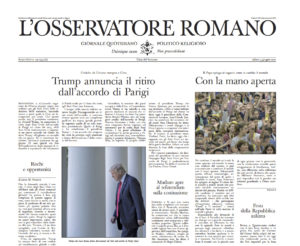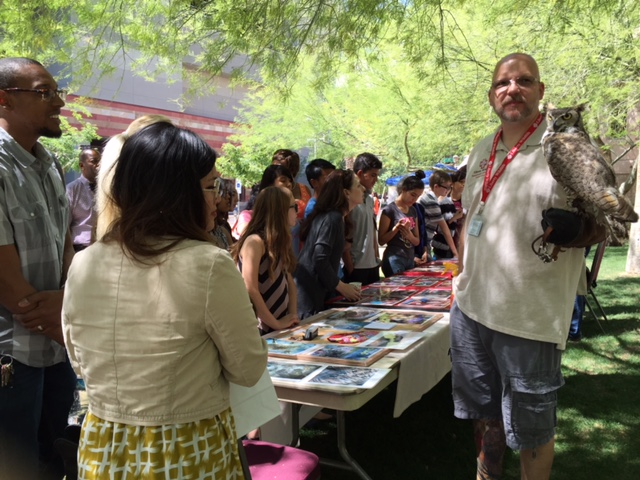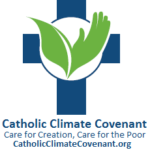Laudato Si’: On Care for our Common Home
Click here to read the encyclical in its entirety
With the pull out of the United States from the Paris agreement, the U.S. Conference of Catholic Bishops issued a statement on June 1 regretting the withdrawal from the consortium created by the United Nations Framework Convention on climate change and signed by 197 parties in November 2016.
In the release, Bishop Oscar Cantú of Los Cruces said the USCCB, “along with Pope Francis and the entire Catholic Church, has consistently upheld the Paris agreement as an important international mechanism to promote environmental stewardship and encourage climate change mitigation.”
Bishop Cantú, who is the chairman of the USCCB Committee on Justice and Peace, called the president’s decision “deeply troubling.”

Despite the U.S. withdrawal from the Paris agreement, Catholics throughout Arizona and the world have been embracing ecological responsibility highlighted in Pope Francis’ encyclical on the environment, Laudato Si’: On Care for our Common Home, promulgated May 24, 2015.
Exactly two years later, during the pope’s visit with President Donald Trump at the Vatican on May 24, Pope Francis gave the president a copy of Laudato Si’ as well as a signed copy of his message from this year’s World Day of Peace and copies of his apostolic exhortations Evangelii Gaudium (The Joy of the Gospel) and Amoris Laetitia on the family.
Parishes make an environmental difference
Since the release of Laudato Si’, parishes across the diocese have formed reading groups, held lectures and offered daylong retreats to study the document. Their preparation is paying off as parishes put Pope Francis’ ideas into action.
For Melanie Cantua and members of the Care of Creation Ministry at St. Mary’s Basilica in Phoenix, living Pope Francis’ message has become their mission. After reading the encyclical together, they are now working to encourage the whole parish to protect the environment.
“What is most interesting (about the document) is the pope’s words really inspire people,” Cantua said. “As Catholics, we just can’t sit and wait for the work to be done.”
The parish bulletin includes a corner where ministry members offer simple tips on caring for God’s creation. Suggestions include planting one tree each, going meatless on Fridays to conserve energy and using hand towels rather than paper towels.
“We use those as opportunities to get the message out,” Cantua said. “It’s weekly education in our bulletin in what they can do every day. … What we are teaching is that it is the culmination of all of our little differences and behavior changes that makes a big difference.”
At the parish Earth Day event on April 23, they also partnered with Liberty Wildlife to bring in a peregrine falcon, a Harris hawk and a great horned owl to teach visitors the importance of wildlife and to show them how to make their yards more wildlife friendly.

A conversion through Laudato Si’
Julie Murphy Erfani, one of the Care for Creation ministry members, was not Catholic when she first learned of the pope’s encyclical.
Murphy Erfani, the director of the master’s program in Social Justice and Human Rights at Arizona State University, had a graduate student in her class who told her about Laudato Si’. The young Catholic student pointed her toward the Franciscan Renewal Center in Scottsdale for more information.
“I started to read it and I was so taken aback by everything it said,” Murphy Erfani said about the encyclical. “Not only is it erudite, it is hopeful. … I was inspired by Laudato Si’.”
She said she took “a spiritual interest in Franciscan Catholicism” motivated by the document. After a few classes with them, she decided to become Catholic and started RCIA classes at St. Mary’s. She was recently accepted into the Church at the Easter Vigil April 15, and she credits her journey to Laudato Si’.
“I found the encyclical inspiring because it is pretty lofty critical theory and it is very sophisticated, but written so it can be intelligible by most people,” Murphy Erfani said.
Retrofitting a parish: both business savvy and moral mandate
Almost five years ago, Sacred Heart Parish in Prescott took to heart Pope Francis’ message of “Let us be the Protector of Creation,” the theme of his inaugural Homily on March 19, 2013, in St. Peter’s Square.
Earlier, in October 2012, Sacred Heart Parish and School in Prescott commissioned a 160-kilowatt solar PV system. In its first three years, Sacred Heart’s solar plant contributed to a 69 percent reduction in energy costs, and the school derives 100 percent of its power from solar.
Smaller changes throughout the parish and school included retrofitting all of the lighting for LED lights for a cost savings of about $12,000 annually, committing to recycling and using organic cleaning supplies and switching to tankless water heaters and low-flow toilets.
“At first it was pragmatic, but it has multiplied our mission,” said Gene Murphy, parish business manager.
Murphy also partners with the Catholic Climate Covenant, and many Sacred Heart students and parishioners have already taken the Franciscan Pledge to pray, act and advocate regarding climate change.
“Because this is what he asked us to do,” Murphy said of Pope Francis. “All the popes have spoken on the protection of the environment — this is all information the popes have been saying for years. One thing about Pope Francis, he is building upon what has already been done, yet he is adding a whole other layer.”
The St. Francis Pledge
I/we pledge to pray, act, and advocate to solve climate change
Taking the St. Francis Pledge commits you or your organization to respond to the moral call for action on climate change. By pledging, you commit to praying, acting and advocating to solve climate change. How you fulfill those commitments is up to you. Here are a few ideas for how to fulfill the Pledge commitments:
Pray
- Set a time to pray for climate action.
- Pray as a family or as a church group.
- Keep a prayer journal.
- Publish prayers via a blog or newsletter.
Act
- Investigate solar and renewable options.
- Learn how climate affects the vulnerable.
- Calculate your carbon footprint.
- Take steps to reduce your footprint.
Advocate
- Connect with policy makers.
- Connect with your municipal council.
- Explore sustainable policies at work.
- Hear your pastor’s position on ecology.







